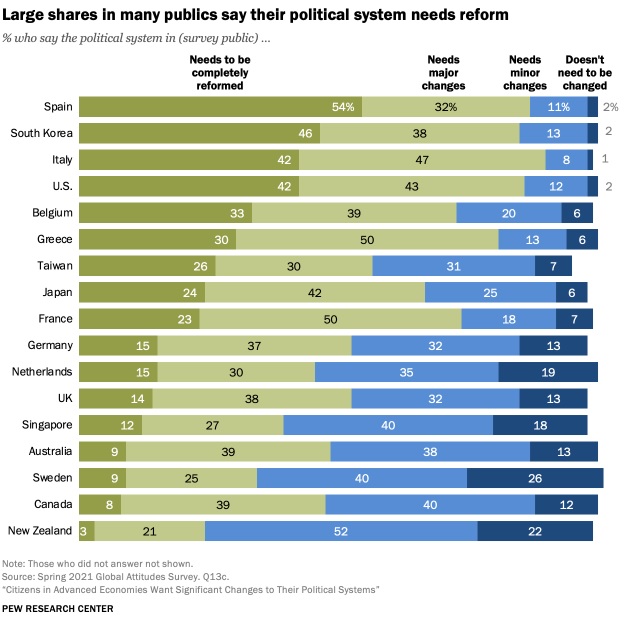https://www.pewresearch.org/global/2021/12/07/global-public-opinion-in-an-era-of-democratic-anxiety/
As democracies have struggled with economic, social and geopolitical upheavals in recent years, the future of liberal democracy has been called into question. Across the world, the state of democratic norms and civil liberties has deteriorated, and populists have achieved amazing success. Once opinionated democracies have stumbled, exposing long-standing weaknesses in their social and institutional structures.
These trends have been well documented by organizations such as the Economist Intelligence Unit, Freedom House, International IDEA and the Variversity of Democracy (V-Dem) project, which measure and track the quality of democracy around the world. Opinion researchers have also focused on these issues by examining how citizens think about democracy and its alternatives.
Part of the current moment of concern about liberal democracy stems from disillusionment with the way democratic societies function. Pew Research Center polls consistently show that a large segment of the population in many countries is unhappy with the way their democracy works. And for many, this discontent leads to a desire for political change. On average, 56% of 17 advanced economies surveyed in 2021 said their political systems needed major changes or needed to be completely reformed. About two thirds or more express this opinion in Italy, Spain, USA, South Korea, Greece, France, Belgium and Japan.
Over the past decade and a half, people around the world have experienced a global financial crisis, and more recently, a global recession triggered by a pandemic. Many have become pessimistic about the long-term economic future, and economic pessimism fuels discontent with the way democracy works and weakens adherence to democratic values.
In addition to the state of the economy and public health, opinions about whether countries adhere to basic principles of equity influence how people relate to the political system. On average, 54% of citizens said that most politicians in their country are corrupt. This opinion was especially strong in Greece (89%) and Russia (82%). When Americans were asked a similar question in the fall of 2020, two-thirds said most politicians were corrupt.
Generally speaking, democracy is a popular idea. When asked about it, people usually say that this is a good way of managing. However, there is often little enthusiasm for this political system and specific democratic rights and institutions. This lack of commitment, which is partly due to the disappointment many feel about the functioning of democracy, may be one of the reasons why some would-be autocrats and political populists have been able to change the rules and norms of liberal democracy with relatively little repercussions.
The same survey found significant support for undemocratic approaches to governance. For example, an average of 49% of people believe that a system in which “experts, not elected officials, make decisions according to what they think is best for the country” will be very or somewhat good.
And although autocracy was less popular, in many countries it was accepted by a large segment of the public. On average, 26% consider “a system in which a strong leader can make decisions without the interference of parliament or courts” as a very or somewhat good way of governance.
Even the military regime had supporters. On average, 24% said that "a system in which the military rules the country" would be a very, or somewhat, a good system. In five countries — Vietnam, Indonesia, India, South Africa and Nigeria — about half or more expressed this opinion, as did at least 40% elsewhere. And the higher-income countries were no exception: 17% of citizens in the United States, Italy, and France believed that military rule could be a good way to govern a country. The fact that so many citizens in "consolidated" democracies seemed willing to accept military rule may seem like a startling revelation, but it is largely in line with what other research projects such as World Values have found over time. Survey and Voter Research Group.
Read also:
Biden and Putin decide for Ukraine, boycott of the Chinese Olympics
Putin prevents Biden from forgetting about Russia and focusing on China


